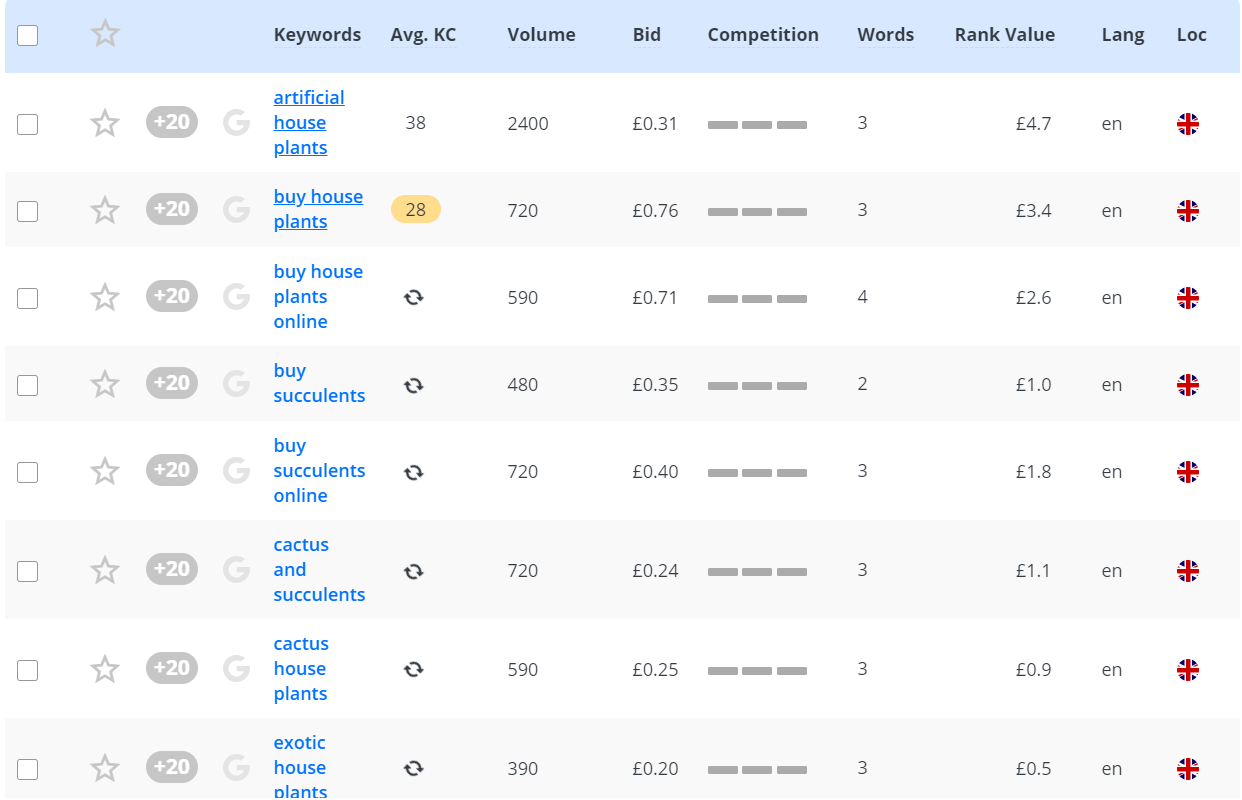6 Best Free & Affordable Keyword Research Tools in 2023
Want to get serious about blogging on your business website but you’ve got no clue where to find the right long-tail keywords to target? Too many of the best keyword research tools to choose from, and they’re all way more expensive than you thought?
I get it. When you start learning about SEO, finding the right tools for your business can be difficult. After all, there are so many options out there, and some of them require a considerable monthly commitment.
Trust me, though: finding the right keywords for your business website and blog doesn’t have to cost you hundreds of pounds.
Here are the best keyword research tools that I use on a regular basis or that come at hand occasionally depending on what type of project I’m working on… all free or affordable!
TIP: bookmark this page so you can go back to this list and have all the links in one place!
Disclaimer: some of these links are affiliate links, which is just a fancy word to say that I will earn a small commission if you make a purchase through them… at NO extra cost for you, obviously. This helps support my work, but don’t worry: I only recommend products that I’ve tried and tested and that I use myself!
1. Google Keyword Planner - Free
With 86.86% of all searches taking place on Google (1), it’d be crazy to ignore their own keyword research tool!
Google’s Keyword planner was originally conceived to research keywords for paid ads, which is why you’ll need to create an account and a campaign to use it (there are some tricks on how to skip this process but, personally, I find them even more time-consuming).
However, you can pause your campaign immediately and never have to worry about it again, which is why Google’s Keyword Planner is actually FREE to use.
You can start with a keyword or add more if you’re trying to narrow down your choice.
TIP: both with Google Keyword Planner and the other keyword research tools included in this article, start with broader keywords that describe your products or services, industry, and topics that you’re planning on covering with your content strategy.
Google Keyword Planner will then tell you the average monthly searches for each, whether the competition is low/medium/high, and what other more specific long-tail keywords are relevant to them.
Plus, you can get other ad-related data, but that’s pretty much all you need when it comes to performing keyword research for your blog posts or website pages.
2. Long Tail Pro - from $25 per month [30% discount!]
As the name suggests, Long Tail Pro helps you take your long-tail keyword game to the next level. A professional level, that is.
When writing blog posts, it’s important to target long-tail keywords consisting of three or more words: it makes it easier to rank, helps you cover more topics in your industry, and allows you to answer the most popular questions that your target audience has when it comes to your field and products.
However, when you can only think of the most generic concepts, it can be hard to find the right ones for your content strategy and website. Well, not with Long Tail Pro.
All you need to do is enter one or more seed keywords. Since we’re talking about seeds, let’s pretend that we’re an online florist, shall we? Some of our seed keywords will definitely be ‘succulents’ and ‘houseplants’.
When you type them in, Long Tail Pro gives you a tidy, alphabetical list of related and more specific keywords. For each keyword, you get lots of juicy data, with the most important being their difficulty, search volume, and competition.
Because you get so many relevant long-tail keywords, it’s much easier to find the right ones to target for your upcoming blog posts.
For example, now that we know that ‘cactus and succulents’ and ‘exotic house plants’ are two popular long-tail keywords in your industry, we can write an article on “How to care for a cactus and succulents” and another one on “The 10 best exotic house plants to create an urban jungle”.
As well as being one of the best keyword research tools to find new ideas and topics to write about, it’s also incredibly useful when it comes to other SEO aspects, like competitor analysis.
They offer different plans starting at $25 per month and I genuinely believe that, for an SME, the most basic plan is more than enough. You’re not going to perform more than 800 keyword researches a day, are you?
Even better, get yourself a Long Tail Pro subscription with a juicy 30% off using my personal discount.
3. Neil Patel’s Ubersuggest - Freemium model
As well as posting lots of useful content, Neil Patel has his own keyword research tool, which is partly free to use.
While it still shows you keyword ideas, search volume and difficulty, my favourite Ubersuggest feature is actually the ‘Questions’ column. After all, answering your target audience’s curiosities is one of the best ways to plan a blog post for your content strategy!
For example, if you’re an ethical clothing brand, you might want to write some blog posts that answer these two popular questions:
To unlock even more keywords you can upgrade to their Pro version. It starts at £29 per month or you can decide to pay a one-off fee (from £290 to £990 depending on what type of plan you’re after) to have it forever.
If you’re tempted by the premium plan but not sure if it’s right for you, you can always try their 7-day trial.
4. Moz Keyword Explorer - freemium model
Moz’s blog is also full of useful tips when it comes to SEO and their own keyword research tool can give you lots of interesting ideas.
What I like the most about it is the level of customization that it offers when it comes to search parameters:
Because it starts at $79 per month, you can argue that it’s not one of the most affordable keyword research tools.
Then why the heck did you include it in this list, Giada?
Simple: because you still get 10 free queries per month. You could pick another tool to rely on for 90% of your searches and sprinkle your content strategy with a few Moz ideas.
5. Answer The Public - freemium
Do you want your target customers to have a “hey, it’s like they read my mind” epiphany whenever they see your blog posts?
Then go on and answer their exact questions!
With Answer The Public, you get to see everything people want to know about a specific keyword.
Let’s say you sell chocolate. Here are some tasty ideas:
For example, you could write a blog post about “How chocolate is made” and “Where chocolate grows”.
Their Pro version starts at $79 but, honestly, the free plan has more than you could ask for.
6. Google Trends - Free
Do you want to up your Google game? Then use two of its keyword research tools!
Google Trends isn’t a traditional keyword research website, but it can actually work as such when it comes to finding topic ideas for your blog posts.
Basically, it shows you what’s trending (in general or about a specific subject) so that you can give a timely twist to your articles or figure out what people want to know the most about your products or industry.
Let’s say that we’ve closed our chocolate shop in order to start making linen dresses instead (hopefully we’ve washed our hands, first!).
Surprise! People care about linen dresses with pockets (obviously). Why don’t we write a blog post about ‘The 10 best linen dresses with pockets’?
You’ll probably need to do a bit of trial and testing to see which of the best keyword research tools you like the most. However, once you’ve done that, SEO will stop being unexplainable sorcery and become a more measurable strategy. You’ve got this!
Found this helpful? I send weekly tips and content prompts to help ambitious female entrepreneurs connect with their dream audience through their marketing copy.
More #crafty blog posts on this topic:
References
Clement, J. (2020, September 2). Worldwide desktop market share of leading search engines from January 2010 to July 2020. Retrieved from https://www.statista.com/statistics/216573/worldwide-market-share-of-search-engines/














